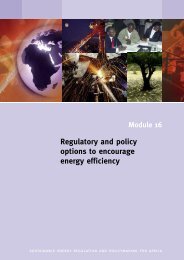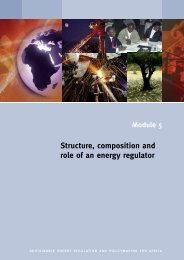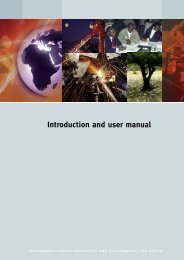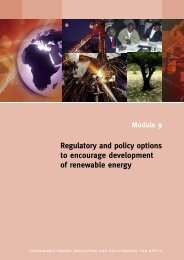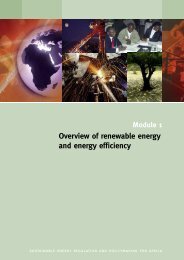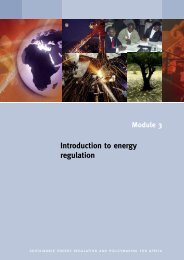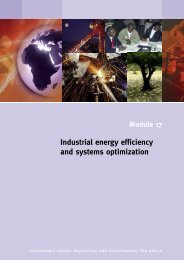Increasing access to energy services in rural areas - REEEP ...
Increasing access to energy services in rural areas - REEEP ...
Increasing access to energy services in rural areas - REEEP ...
Create successful ePaper yourself
Turn your PDF publications into a flip-book with our unique Google optimized e-Paper software.
MODULE 10: INCREASING ACCESS TO ENERGY SERVICES IN RURAL AREAS<br />
page 10.77<br />
1. BACKGROUND<br />
Renewable <strong>energy</strong> (exclud<strong>in</strong>g large-hydro) currently contributes an <strong>in</strong>significant<br />
part of electricity supply <strong>in</strong> Ghana. For example, by 2001, the estimated 4,000 offgrid<br />
PV systems <strong>in</strong>stalled nationwide had a <strong>to</strong>tal capacity of 1MW, compared <strong>to</strong><br />
the grid capacity of over 1,700MW <strong>in</strong> 2003. 1 Electricity generated from renewable<br />
<strong>energy</strong> is used at the <strong>in</strong>dividual household or <strong>in</strong>stitution level, and the systems<br />
are usually not connected <strong>to</strong> the grid.<br />
Renewable <strong>energy</strong> technologies (RETs) are not currently targeted for development<br />
under a concerted policy regime <strong>in</strong> Ghana. Moreover, none of the electrification<br />
programmes undertaken <strong>to</strong> date have <strong>in</strong>cluded renewable <strong>energy</strong> as an alternative<br />
source of power. This situation means that development of renewables<br />
rema<strong>in</strong>s largely <strong>in</strong> the hands of <strong>in</strong>dividuals with little government support. There<br />
is no process <strong>in</strong> place presently for <strong>in</strong>dividuals or cooperatives <strong>to</strong> feed the power<br />
generated from renewable <strong>energy</strong> systems <strong>in</strong><strong>to</strong> the national grid. However, several<br />
efforts have been made through feasibility and pilot programmes <strong>to</strong> develop<br />
experience with renewables. One such project is the w<strong>in</strong>d <strong>energy</strong> project described<br />
<strong>in</strong> this case study.<br />
2. PROJECT DESCRIPTION<br />
2.1. Introduction<br />
W<strong>in</strong>d <strong>energy</strong> is becom<strong>in</strong>g a mature technology for electricity generation across<br />
the world. In Ghana, w<strong>in</strong>d <strong>energy</strong> is one of the renewable <strong>energy</strong> options considered<br />
as viable <strong>to</strong> be exploited for electricity generation. Even though the w<strong>in</strong>d<br />
speeds <strong>in</strong> Ghana are quite low <strong>in</strong> general, tests have shown that along the coast<br />
there is sufficient w<strong>in</strong>d <strong>to</strong> power small turb<strong>in</strong>es.<br />
The Ghana W<strong>in</strong>d Energy Project <strong>in</strong>tends <strong>to</strong> provide power <strong>to</strong> off-grid communities<br />
by us<strong>in</strong>g locally manufactured w<strong>in</strong>d turb<strong>in</strong>es, which, <strong>in</strong> addition <strong>to</strong> be<strong>in</strong>g cheaper<br />
than imported models, will create the required technical capacity locally for the<br />
development of the technology.<br />
1<br />
Electricity Sec<strong>to</strong>r Overview; Ghana Energy Commission



